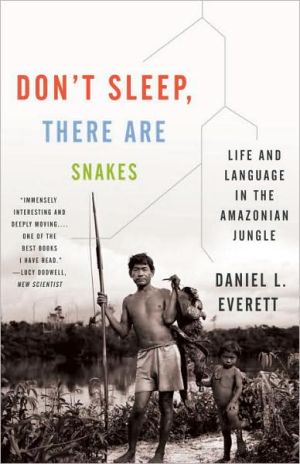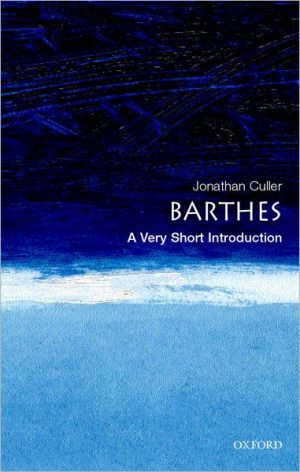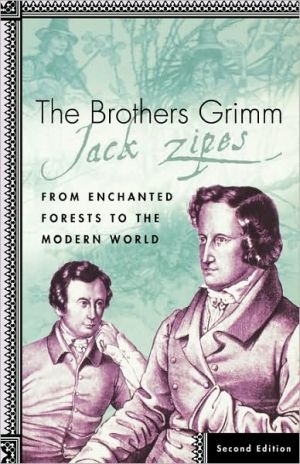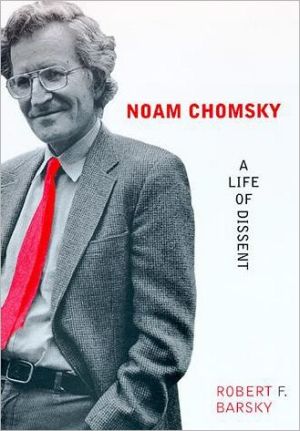Don't Sleep, There Are Snakes: Life and Language in the Amazonian Jungle
A riveting account of the astonishing experiences and discoveries made by linguist Daniel Everett while he lived with the Pirahã, a small tribe of Amazonian Indians in central Brazil. Daniel Everett arrived among the Pirahã with his wife and three young children hoping to convert the tribe to Christianity. Everett quickly became obsessed with their language and its cultural and linguistic implications. The Pirahã have no counting system, no fixed terms for color, no concept of war, and...
Search in google:
A riveting account of the astonishing experiences and discoveries made by linguist Daniel Everett while he lived with the Pirahã, a small tribe of Amazonian Indians in central Brazil. Daniel Everett arrived among the Pirahã with his wife and three young children hoping to convert the tribe to Christianity. Everett quickly became obsessed with their language and its cultural and linguistic implications. The Pirahã have no counting system, no fixed terms for color, no concept of war, and no personal property. Everett was so impressed with their peaceful way of life that he eventually lost faith in the God he'd hoped to introduce to them, and instead devoted his life to the science of linguistics. Part passionate memoir, part scientific exploration, Everett's life-changing tale is riveting look into the nature of language, thought, and life itself. The Washington Post - Nora Krug Everett chronicles his experience in a captivating account that is part anthropological study and part memoir…the book offers a vivid documentary of life in the Amazon and a heartfelt coming of age.
Prologue\ “Look! There he is, Xigagaí, the spirit.”\ “Yes, I can see him. He is threatening us.”\ “Everybody, come see Xigagaí. Quickly! He is on the beach!”\ I roused from my deep sleep, not sure if I was dreaming or hearing this conversation. It was 6:30 on a Saturday morning in August, the dry season of 1980. The sun was shining, but not yet too hot. A breeze was blowing up from the Maici River in front of my modest hut in a clearing on the bank. I opened my eyes and saw the palm thatch above me, its original yellow graying from years of dust and soot. My dwelling was flanked by two smaller Pirahã huts of similar construction, where lived Xahoábisi, Kóhoibiíihíai, and their families.\ Mornings among the Pirahãs, so many mornings, I picked up the faint smell of smoke drifting from their cook fires, and the warmth of the Brazilian sun on my face, its rays softened by my mosquito net. Children were usually laughing, chasing one another, or noisily crying to nurse, the sounds reverberating through the village. Dogs were barking. Often when I first opened my eyes, groggily coming out of a dream, a Pirahã child or sometimes even an adult would be staring at me from between the paxiuba palm slats that served as siding for my large hut. This morning was different.\ I was now completely conscious, awakened by the noise and shouts of Pirahãs. I sat up and looked around. A crowd was gathering about twenty feet from my bed on the high bank of the Maici, and all were energetically gesticulating and yelling. Everyone was focused on the beach just across the river from my house. I got out of bed to get a better look—and because there was no way to sleep through the noise.\ I picked my gym shorts off the floor and checked to make sure that there were no tarantulas, scorpions, centipedes, or other undesirables in them. Pulling them on, I slipped into my flip- flops and headed out the door. The Pirahãs were loosely bunched on the riverbank just to the right of my house. Their excitement was growing. I could see mothers running down the path, their infants trying to hold breasts in their mouths.\ The women wore the same sleeveless, collarless, midlength dresses they worked and slept in, stained a dark brown from dirt and smoke. The men wore gym shorts or loincloths. None of the men were carrying their bows and arrows. That was a relief. Prepubescent children were naked, their skin leathery from exposure to the elements. The babies’ bottoms were calloused from scooting across the ground, a mode of locomotion that for some reason they prefer to crawling. Everyone was streaked from ashes and dust accumulated by sleeping and sitting on the ground near the fire.\ It was still around seventy- two degrees, though humid, far below the hundred- degree- plus heat of midday. I was rubbing the sleep from my eyes. I turned to Kóhoi, my principal language teacher, and asked, “What’s up?” He was standing to my right, his strong, brown, lean body tensed from what he was looking at.\ “Don’t you see him over there?” he asked impatiently. “Xigagaí, one of the beings that lives above the clouds, is standing on the beach yelling at us, telling us he will kill us if we go to the jungle.”\ “Where?” I asked. “I don’t see him.”\ “Right there!” Kóhoi snapped, looking intently toward the middle of the apparently empty beach.\ “In the jungle behind the beach?”\ “No! There on the beach. Look!” he replied with exasperation.\ In the jungle with the Pirahãs I regularly failed to see wildlife they saw. My inexperienced eyes just weren’t able to see as theirs did.\ But this was different. Even I could tell that there was nothing on that white, sandy beach no more than one hundred yards away. And yet as certain as I was about this, the Pirahãs were equally certain that there was something there. Maybe there had been something there that I just missed seeing, but they insisted that what they were seeing, Xigagaí, was still there.\ Everyone continued to look toward the beach. I heard Kristene, my six- year- old daughter, at my side.\ “What are they looking at, Daddy?”\ “I don’t know. I can’t see anything.”\ Kris stood on her toes and peered across the river. Then at me. Then at the Pirahãs. She was as puzzled as I was.\ Kristene and I left the Pirahãs and walked back into our house. What had I just witnessed? Over the more than two decades since that summer morning, I have tried to come to grips with the significance of how two cultures, my European- based culture and the Pirahãs’ culture, could see reality so differently. I could never have proved to the Pirahãs that the beach was empty. Nor could they have convinced me that there was anything, much less a spirit, on it.\ As a scientist, objectivity is one of my most deeply held values. If we could just try harder, I once thought, surely we could each see the world as others see it and learn to respect one another’s views more readily. But as I learned from the Pirahãs, our expectations, our culture, and our experiences can render even perceptions of the environment nearly incommensurable cross- culturally.\ The Pirahãs say different things when they leave my hut at night on their way to bed. Sometimes they just say, “I’m going.” But frequently they use an expression that, though surprising at first, has come to be one of my favorite ways of saying good night: “Don’t sleep, there are snakes.” The Pirahãs say this for two reasons. First, they believe that by sleeping less they can “harden themselves,” a value they all share. Second, they know that danger is all around them in the jungle and that sleeping soundly can leave one defenseless from attack by any of the numerous predators around the village. The Pirahãs laugh and talk a good part of the night. They don’t sleep much at one time. Rarely have I heard the village completely quiet at night or noticed someone sleeping for several hours straight. I have learned so much from the Pirahãs over the years. But this is perhaps my favorite lesson. Sure, life is hard and there is plenty of danger. And it might make us lose some sleep from time to time. But enjoy it.\ Life goes on.\ I went to the Pirahãs when I was twenty- six years old. Now I am old enough to receive senior discounts. I gave them my youth. I have contracted malaria many times. I remember several occasions on which the Pirahãs or others threatened my life. I have carried more heavy boxes, bags, and barrels on my back through the jungle than I care to remember. But my grandchildren all know the Pirahãs. My children are who they are in part because of the Pirahãs. And I can look at some of those old men (old like me) who once threatened to kill me and recognize some of the dearest friends I have ever had—men who would now risk their lives for me.\ This book is about the lessons I have learned over three decades of studying and living with the Pirahãs, a time in which I have tried my best to comprehend how they see, understand, and talk about the world and to transmit these lessons to my scientific colleagues. This journey has taken me to many places of astounding beauty and into many situations I would rather not have entered. But I am so glad that I made the journey—it has given me precious and valuable insights into the nature of life, language, and thought that could not have been learned any other way.\ The Pirahãs have shown me that there is dignity and deep satisfaction in facing life and death without the comfort of heaven or the fear of hell and in sailing toward the great abyss with a smile. I have learned these things from the Pirahãs, and I will be grateful to them as long as I live.
Some Notes on the Piraha Language as Used in This BookPrefacePt. 1 Life1 Discovering the World of the Pirahas 32 The Amazon 233 The Cost of Discipleship 314 Sometimes You Make Mistakes 585 Material Culture and the Absence of Ritual 716 Families and Community 857 Nature and the Immediacy of Experience 1158 A Teenager Named Tukaaga: Murder and Society 1439 Land to Live Free 15010 Caboclos: Vignettes of Amazonian Brazilian Life 159Pt. 2 Language11 Changing Channels with Piraha Sounds 17712 Piraha Words 19213 How Much Grammar Do People Need? 20214 Values and Talking: The Partnership between Language and Culture 20915 Recursion: Language as a Matrioshka Doll 22416 Crooked Heads and Straight Heads: Perspectives on Language and Truth 244Pt. 3 Conclusion17 Converting the Missionary 263Epilogue: Why Care about Other Cultures and Languages? 275
\ Nora KrugEverett chronicles his experience in a captivating account that is part anthropological study and part memoir…the book offers a vivid documentary of life in the Amazon and a heartfelt coming of age.\ —The Washington Post\ \ \ \ \ Publishers WeeklySignature\ Reviewed by Christine Kenneally\ The ways language and thought intertwine have long intrigued scientists. Does language shape the way we see the world? Does the world influence the structure of language? Do we think in words? Such lofty questions pondered in many an ivory tower would go unanswered without the mostly anonymous work of field linguists. These scholars venture into isolated communities and wrestle with culture shock, broken tape recorders and dysentery-all to learn an unfamiliar language from the ground up. Their work is painstaking, and no matter how smart or how educated they are, their projects must begin with the most elementary communicative tactics-they point at a rock or a tree or a bird, and whether they are in Australia's Western Desert, the remote islands of Indonesia or the jungles of Brazil, their interlocutor will respond, "rock" or "tree" or "bird" in the native tongue.\ Dan Everett's life as a field linguist began when he entered a Pirahã village in the Amazonian jungle in December 1977. After being greeted by a happy, chattering crowd, he walked over to a man cooking on a small fire. First, he tapped his own chest and said, "Daniel," then he pointed at the animal being cooked on the fire. "Káixihí," said the man. Everett pointed at a stick. "Xií" said the man. Everett dropped the stick and said, "I drop the xii." "Xií xi bigí kíobíi," his new friend replied, meaning "stick it ground falls." Thus began 30 years of dedication to the Pirahã and their native tongue, a mystifying system of sound and rules unrelated to any other language in the world.\ In this fascinating and candid account of life with the Pirahã, Everett describes how he learned to speak fluent Pirahã (pausing occasionally to club the snakes that harassed him in his Amazonian "office"). He also explains his discoveries about the language-findings that have kicked off more than one academic brouhaha. Everett learned that Pirahã does not use what are supposed to be universal aspects of grammar, an observation that runs counter to linguistic dogma about how culture, the brain and language connect. For Everett, Pirahã is evidence that culture plays a crucial and previously unacknowledged role in the creation of language.\ Everett's life with the Pirahã cost him dearly. He almost lost two family members to malaria, and his first marriage broke down after years of highly productive shared field work. But life in the Amazon taught him a great deal about human nature, too, perhaps more about his own than that of the Pirahã. Everett began his linguistic work as a Christian missionary, but the Pirahã were marvelously impervious to his promise of a life with Jesus. They pointed out that Everett simply had no proof for the supernatural world he described, and in the end he found himself agreeing with them. He left the church, choosing a world that more honestly integrated his goals as a scholar with the world view of his Pirahã friends-one where evidence matters. (Nov. 11)\ Christine Kenneally is the author of The First Word: The Search for the Origins of Language, a finalist for the L.A. Times Book Prize.\ Copyright © Reed Business Information, a division of Reed Elsevier Inc. All rights reserved.\ \ \ Library JournalEverett (languages, literatures, & cultures, Illinois State Univ.) has crafted a fascinating account of his 30 years of linguistics work among the Pirahã (pronounced pee-da-HAN) Indians, a tribal group living along the Maici and Marmelos Rivers in a remote area of western Brazil. Everett and his family first lived among the Pirahã in 1977 as Christian missionaries. Although he had prepared for language learning through missionary field training, Everett's real interest in linguistic theories blossomed during his graduate study at Brazil's State University of Campinas. During his years among the Pirahã, Everett has undertaken serious linguistic study and has discovered many interesting and unique aspects of the Pirahã language, which is unrelated to any other. The language has a paucity of vowels (three) and consonants (eight), but it has a complex system of varying tones and stresses. It lacks numbers or any type of counting system and also lacks specific terms for colors. Everett's findings about the language have led him to challenge some of the most widely accepted theories put forth by renowned linguists Noam Chomsky and Stephen Pinker. With a clear, detail-rich writing style, Everett provides evocative ethnographic descriptions of Pirahã life and culture as well as perceptive linguistic analysis. Throughout, he emphasizes the interconnectedness of language and culture and the importance of studying both together if one wants to understand either. This excellent study is highly recommended for linguistics and anthropology collections in academic and large public libraries [See Prepub Alert, LJ8/08.]\ —Lee Arnold\ \ \






